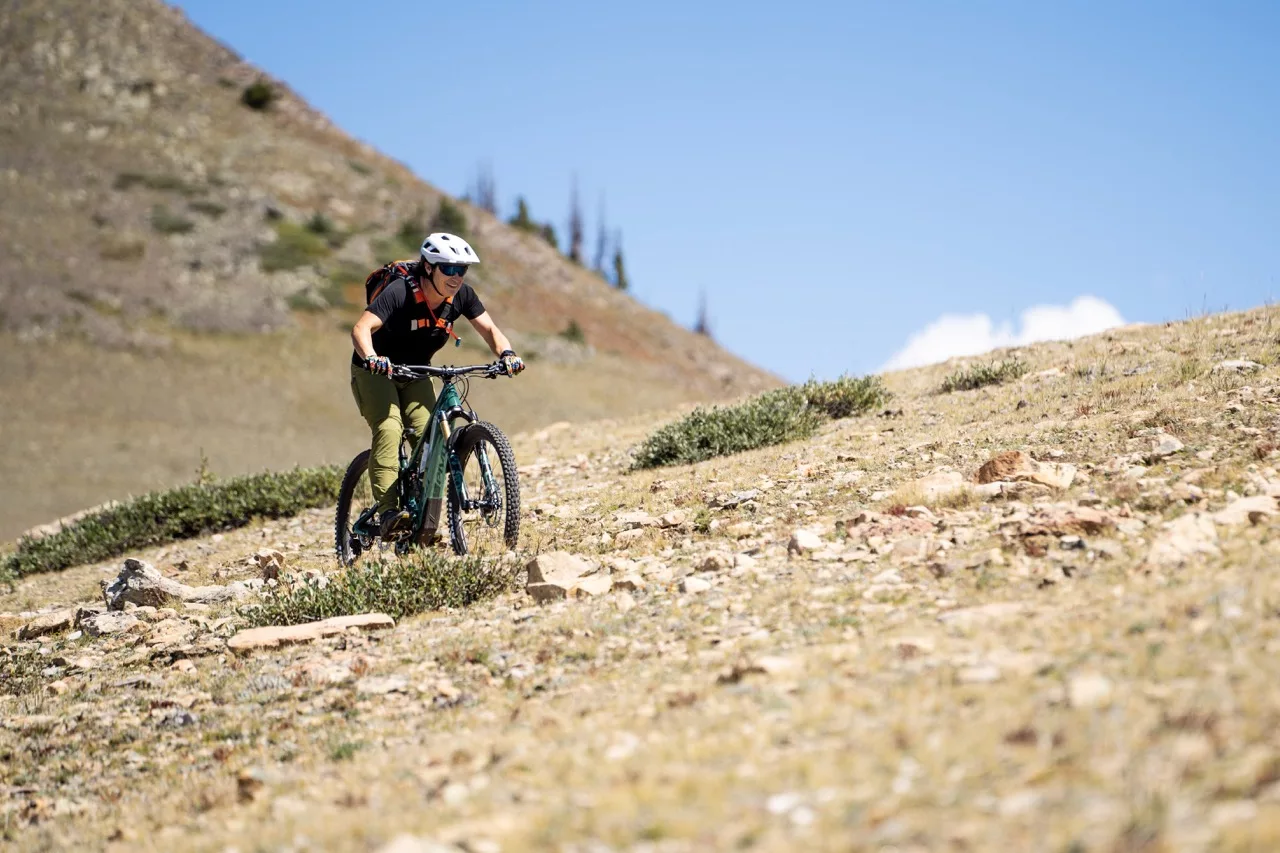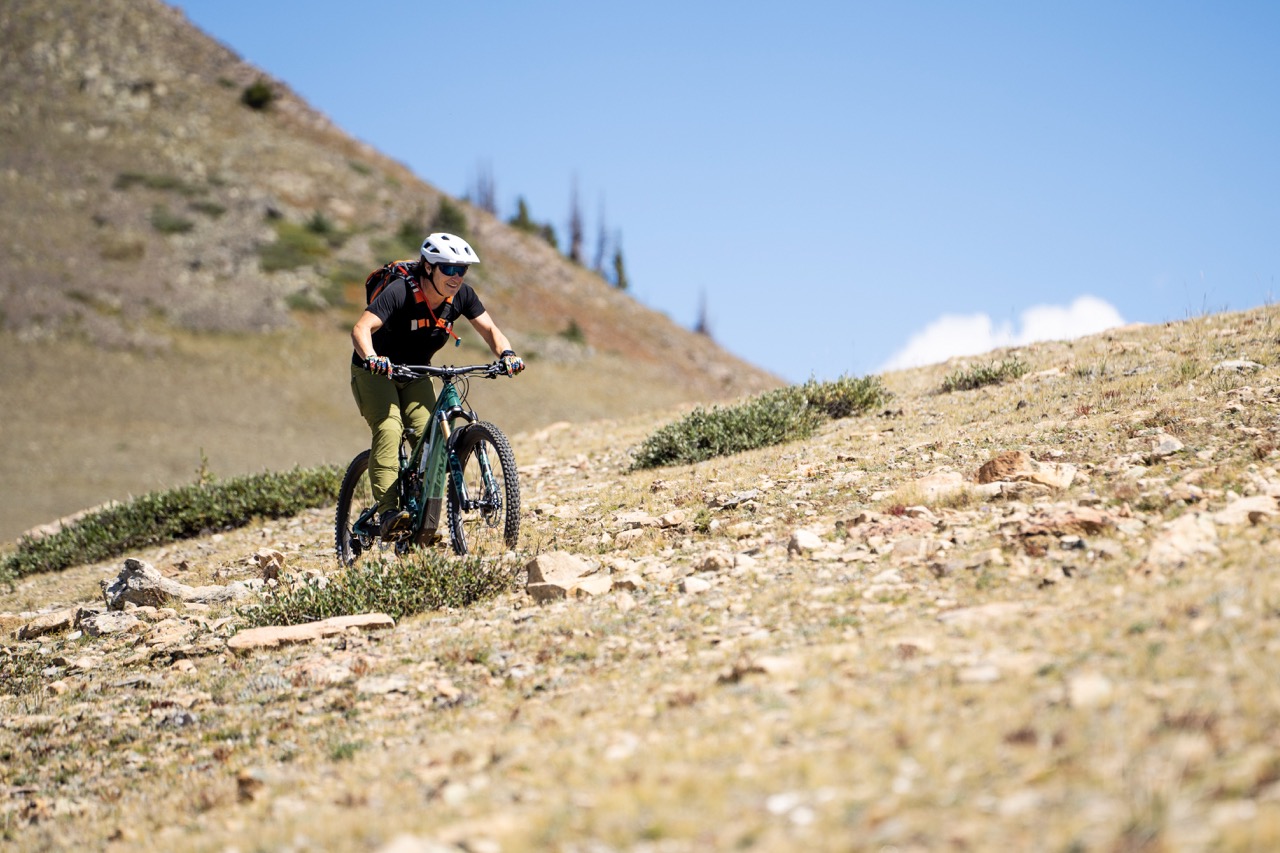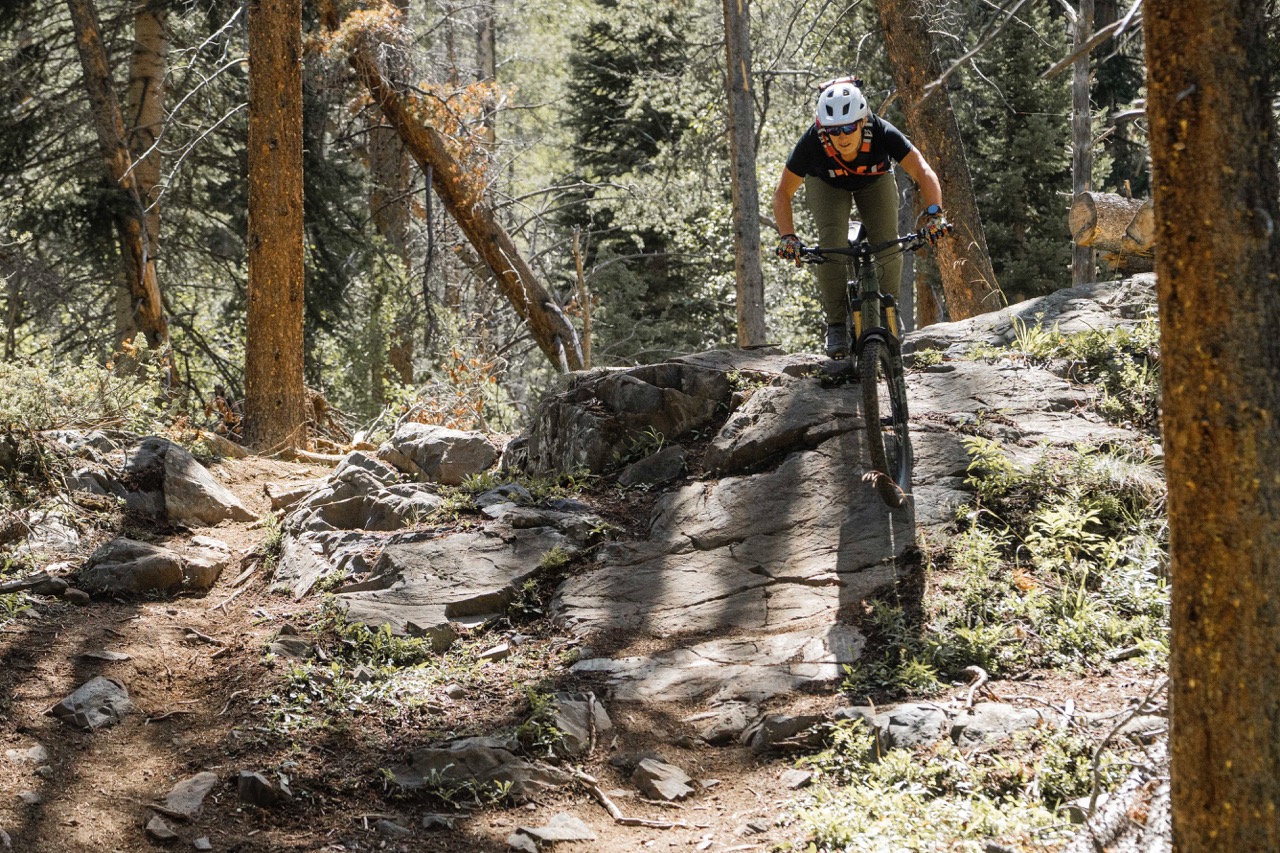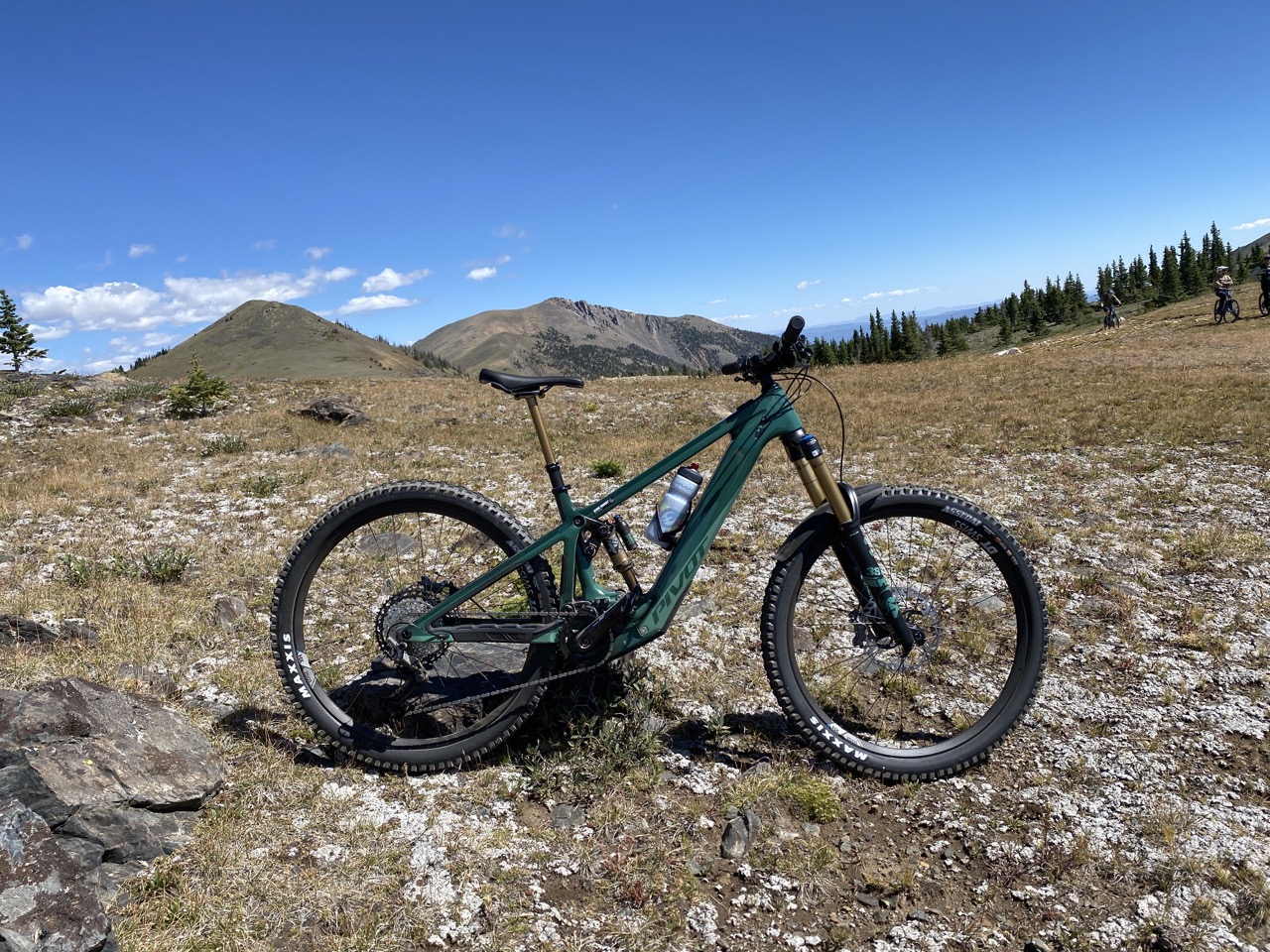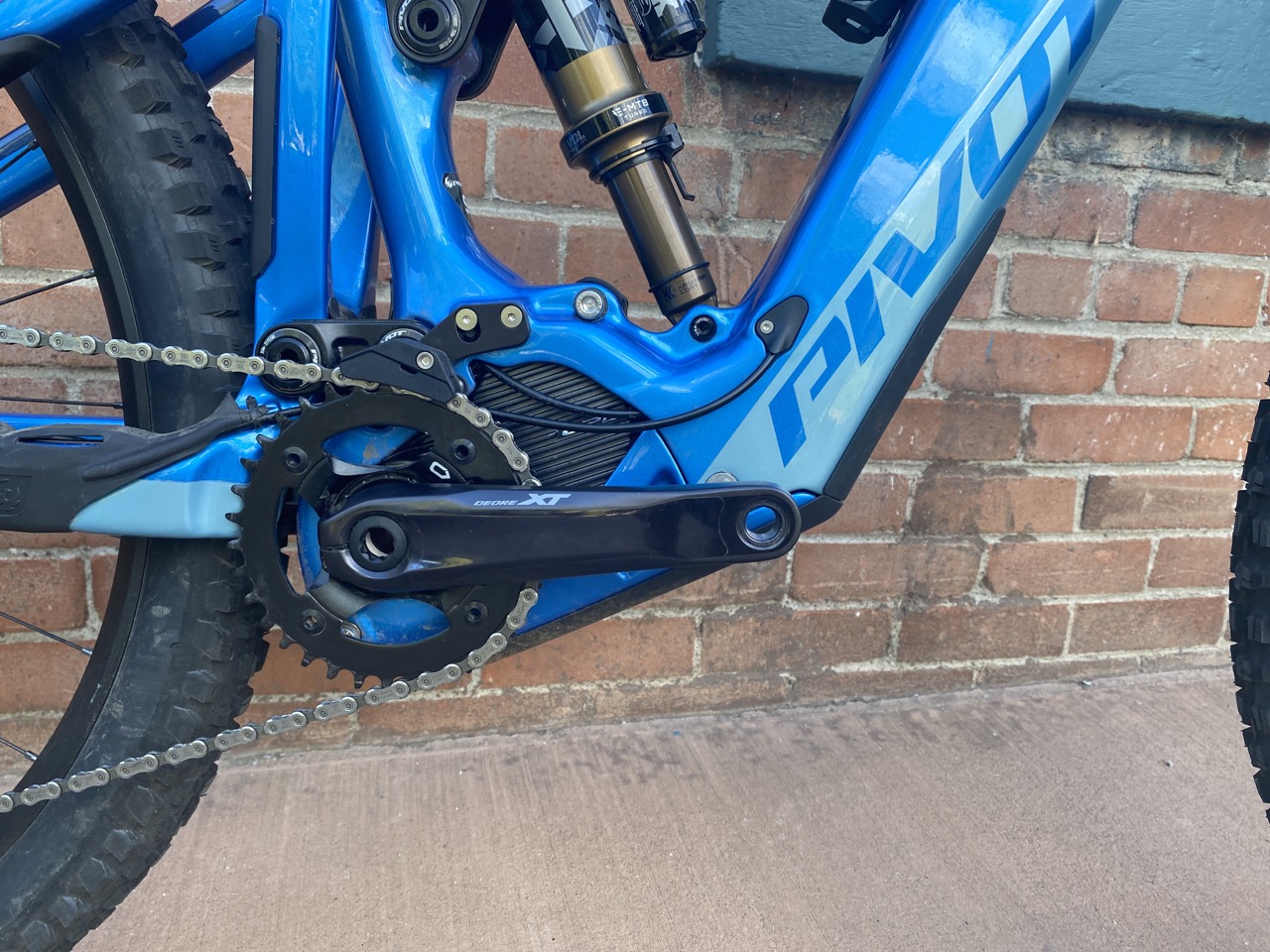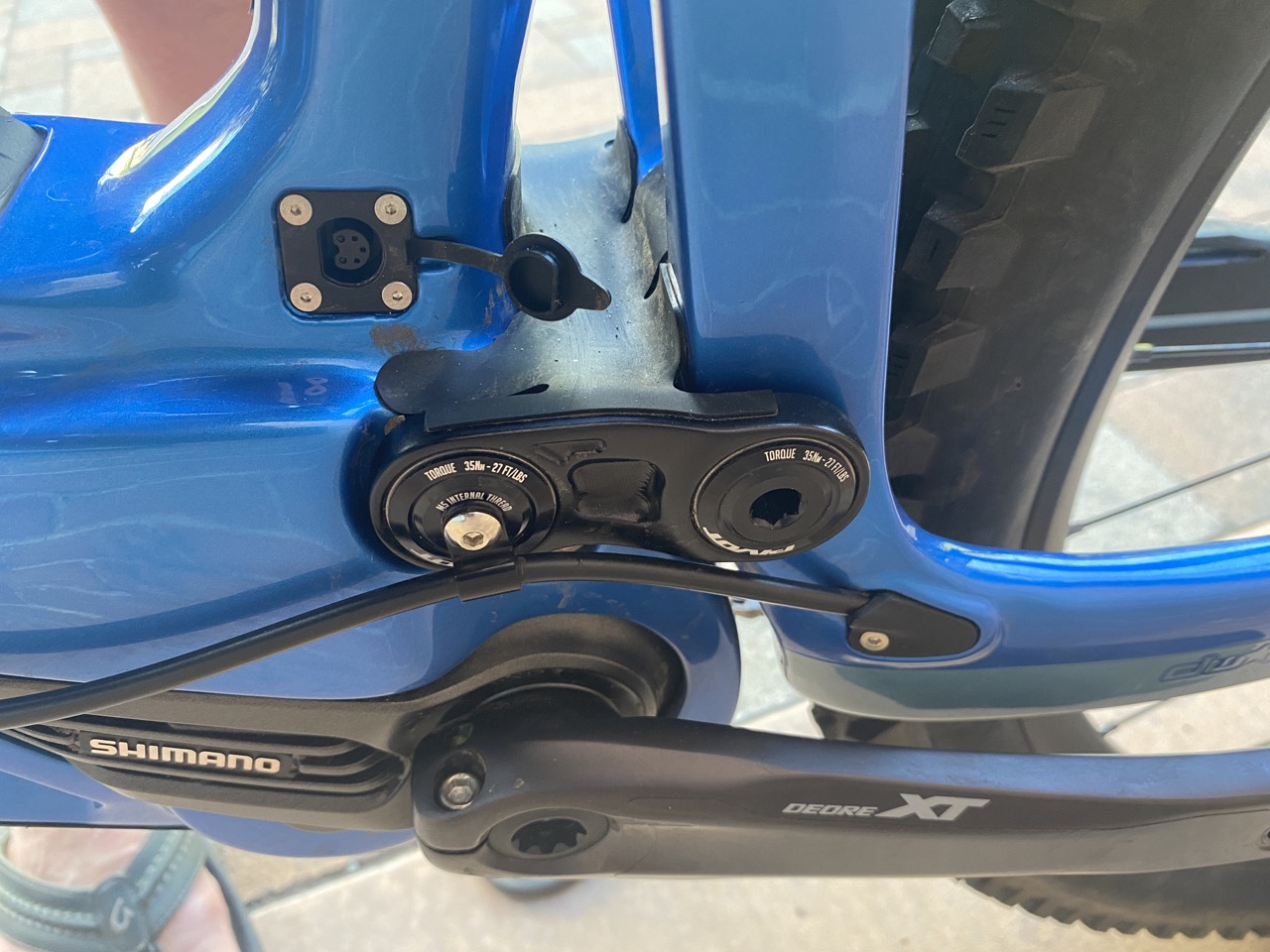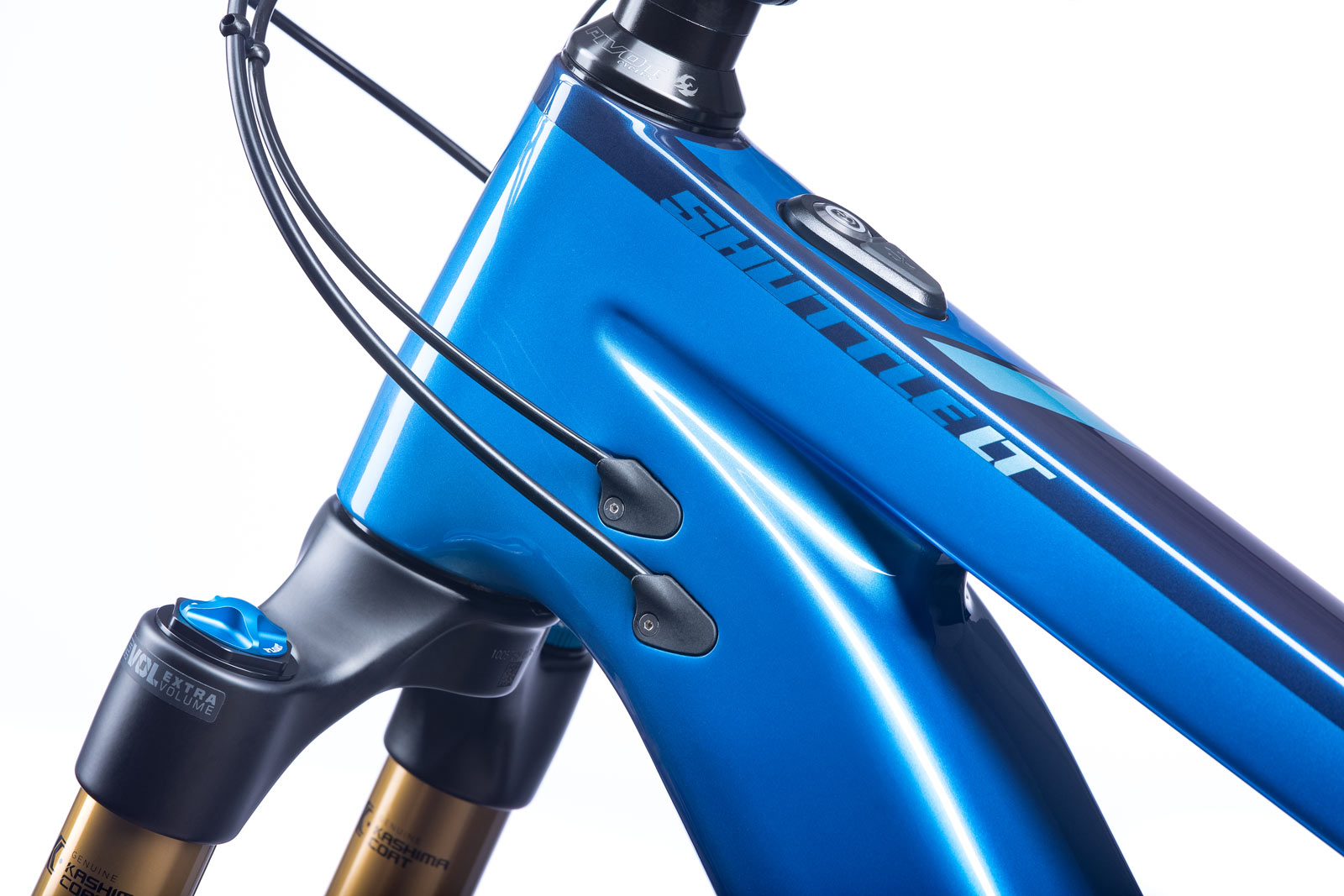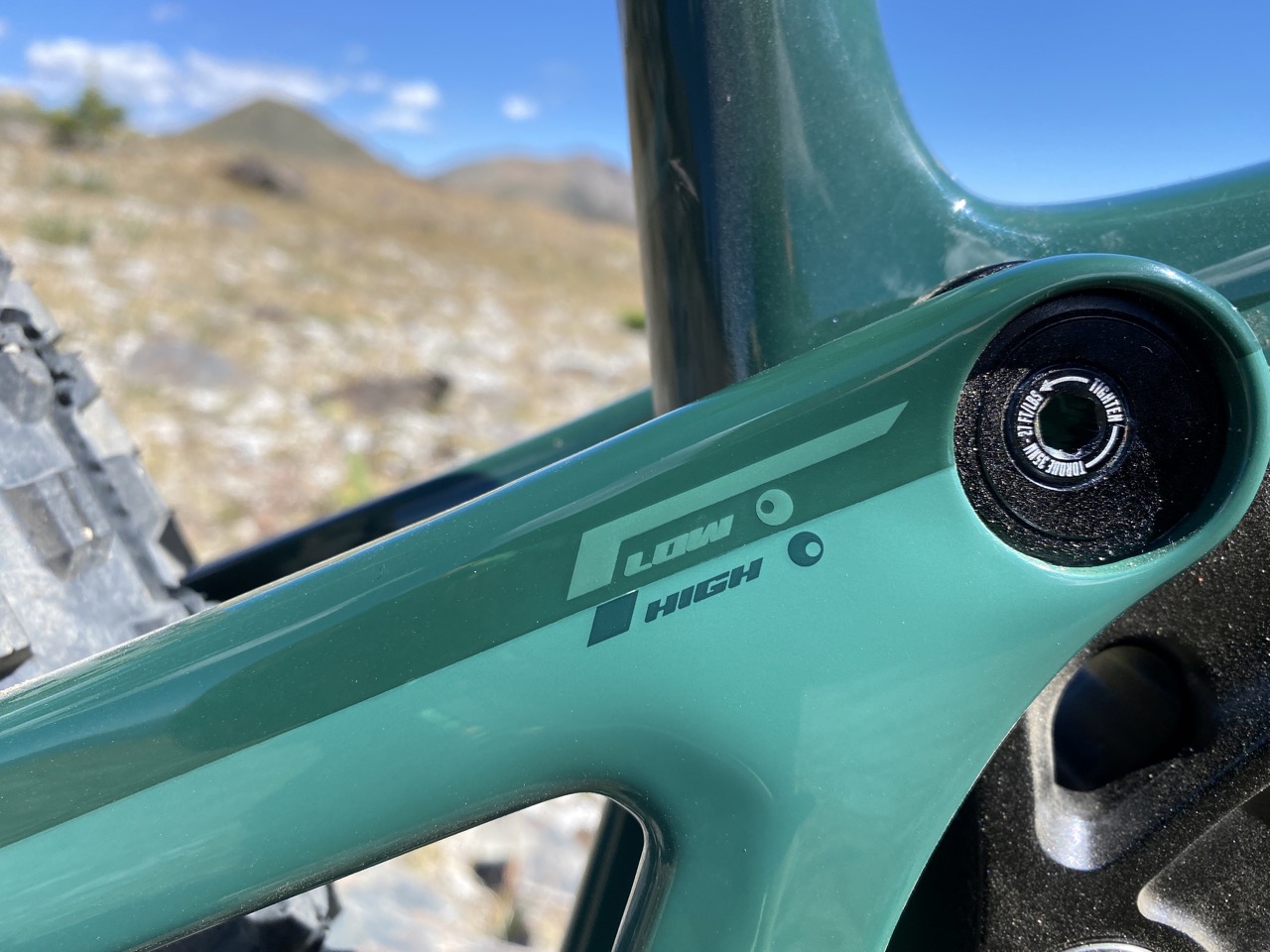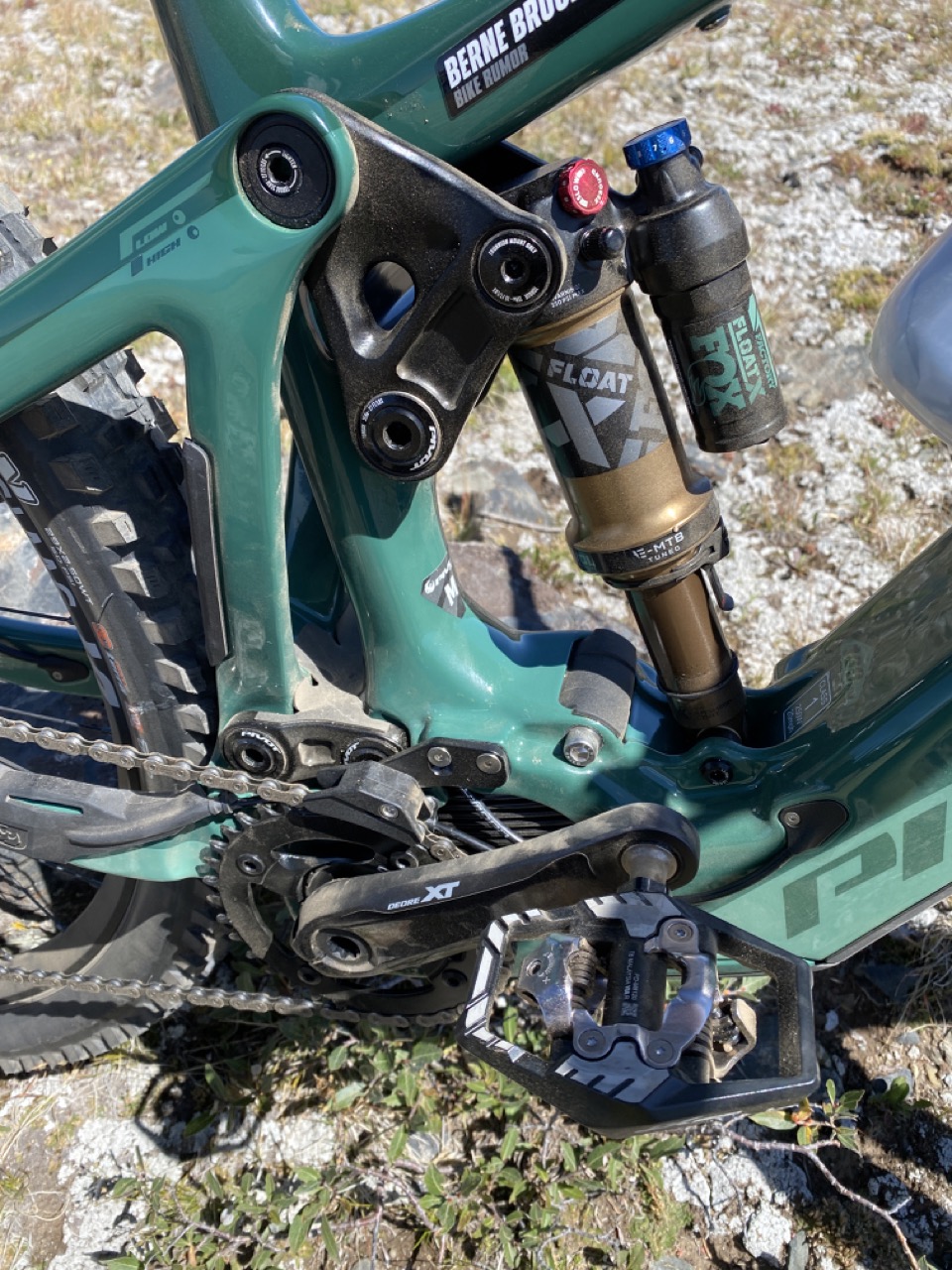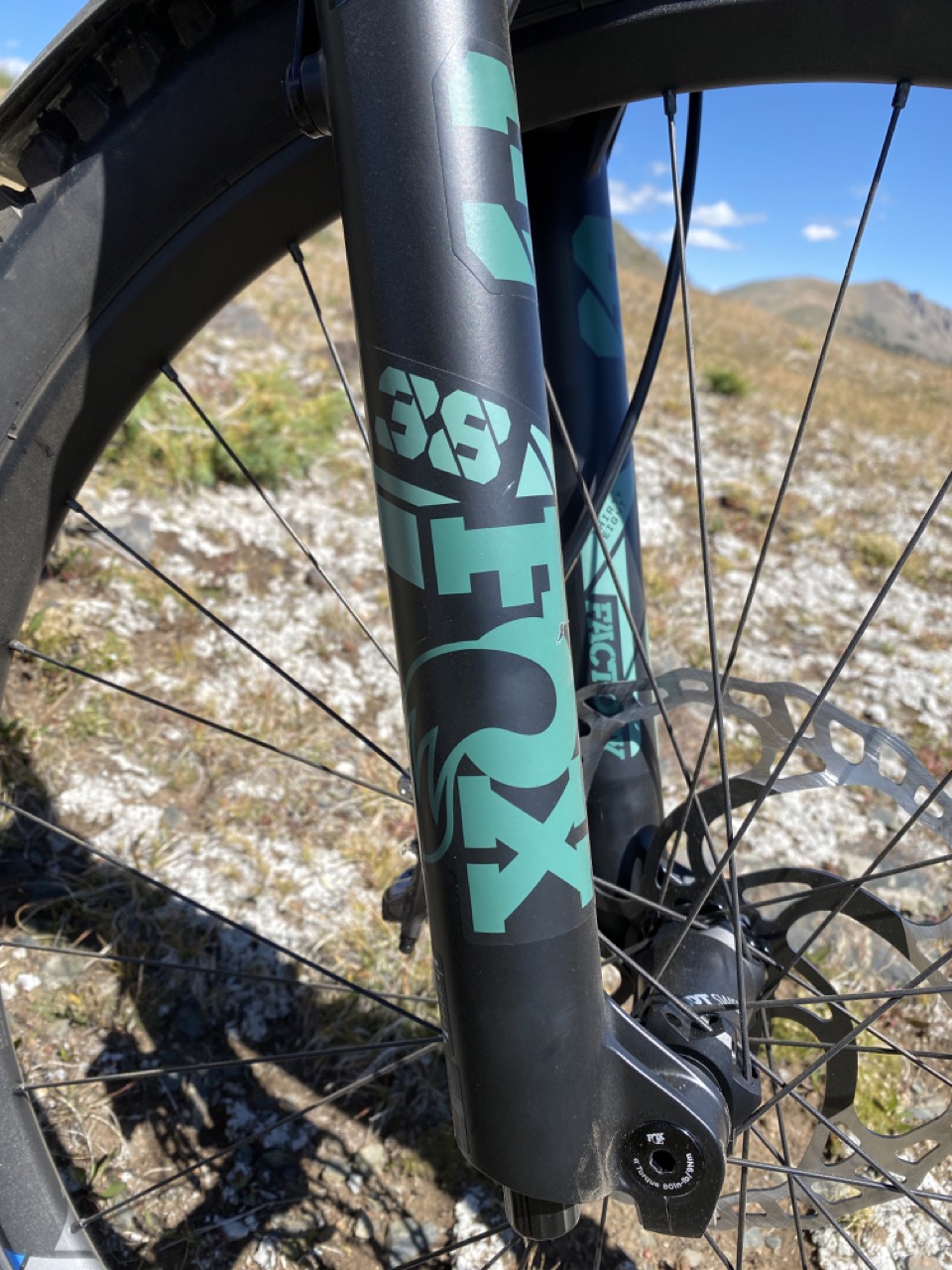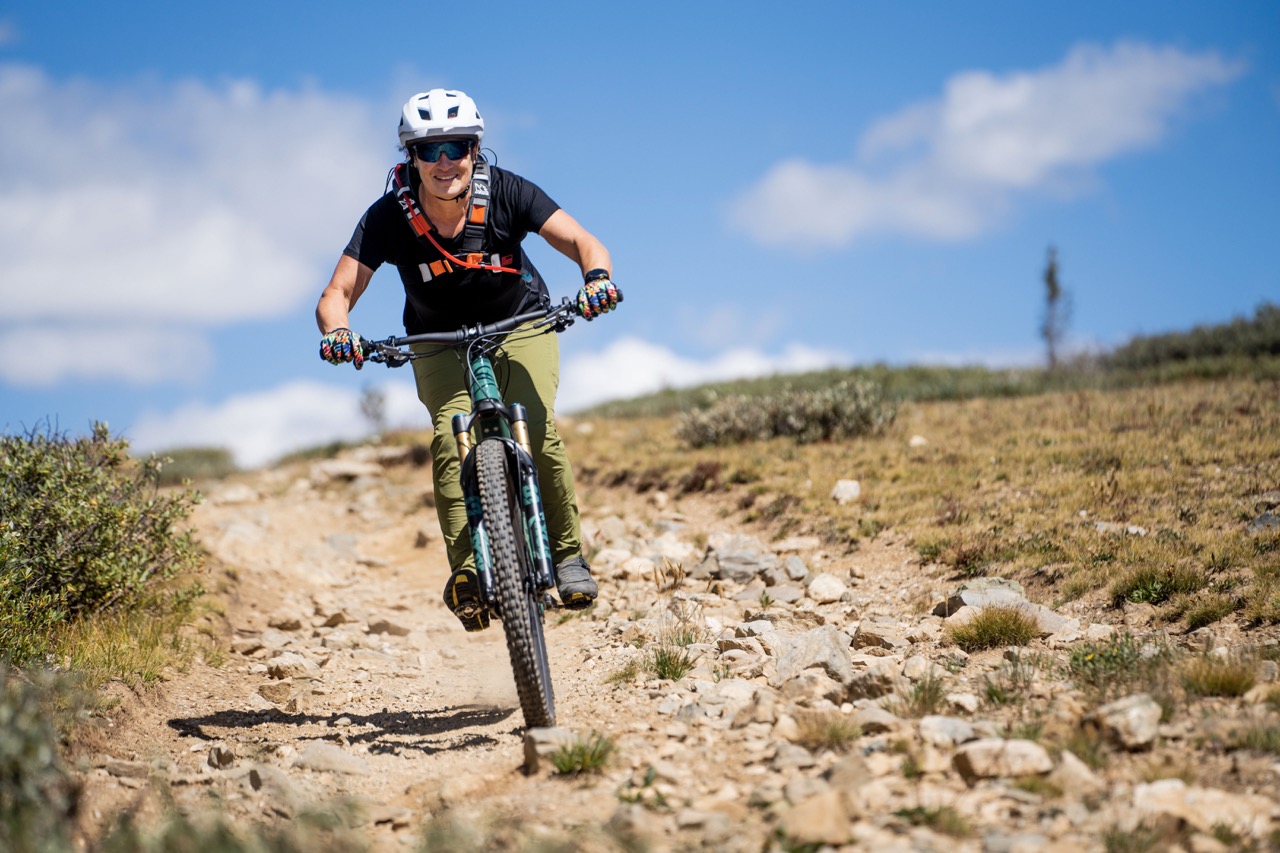There are plenty of good enduro-style e-mountain bikes on the market. This one is great.
Pivot’s Shuttle LT pedal assist e-bike showcases Shimano’s EP8 system, the only drive unit claimed to be specifically designed for mountain bikes. It uses a removable, 756-watt, Shimano-certified battery, 160 Float X/170 E-MTB 38 29″, 44mm offset, GRIP2 Fox suspension, and the geometry and the kinematics of Pivot’s Firebird 29.
The Ride
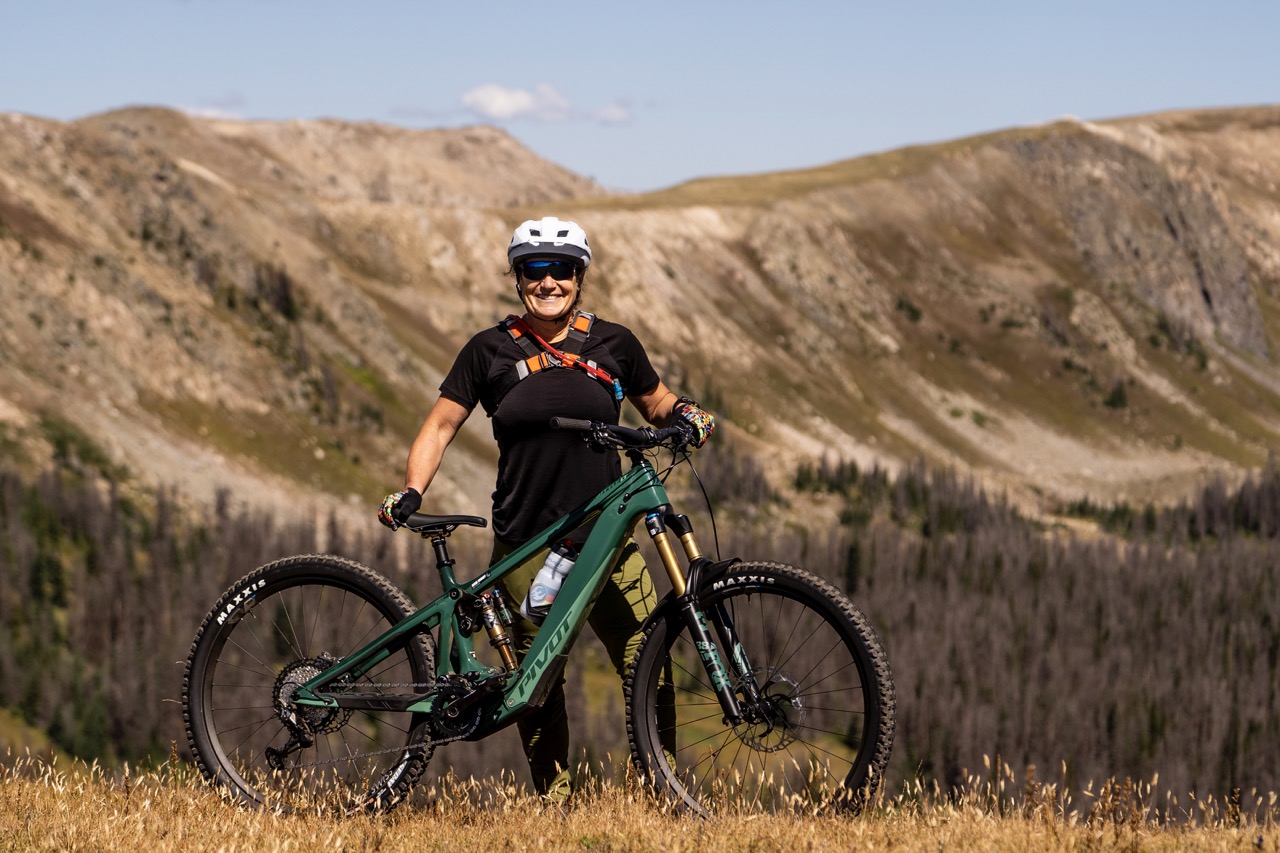
I hopped on this bike at the top of Monarch Pass – around 11,000 feet in altitude–the morning after arriving in Colorado from sea level. I pedaled out of the lot and up the double track with the support of this bike’s full boost power behind me. When I turned off onto the first stretch of rooty and rocky singletrack, I bumped the power down a notch to Trail, and had more than enough support and all the maneuverability I needed. The bike absorbed the chunder and steered with precision letting me pick my line around chunky rocks, and charged through steep switchbacks with powerful control.
To smash or to finesse–that is always the question for me when I ride e-bikes on technical trails. The Shuttle LT let me do both. The bike was lively, playful and it pedaled efficiently without the heavy feeling of most other enduro e-bikes whether I was pounding through rock gardens or trying to carve through them. It was nimble in technical terrain.
Blasting through a crash pad of rocks and roots descending Green Creek off Monarch Crest, baby head boulders, and steep sections of slippery dirt, the bike went where I pointed it, sailing smoothly. The ride wasn’t so plush it got boring, and the harder I pushed the bike the better it rode. Pivot’s DW link felt balanced. I never needed to lock the shock to climb, and the bike didn’t squat under power. Shimano 160mm cranks kept me from rock-striking–which is even more important on an ebike. I could power through the chunder thanks to the bike’s low center of gravity and short cranks. I felt settled in on the bike, in control of the ride, and despite the shorter cranks, I never felt like I lacked torque.
What’s Inside
At 49.8 pounds, the bike is competitive in weight with others on the market. But it rides light. Part of it might be psychological. The Shuttle LT has a trim downtube that was made possible by a 726-watt, Shimano-certified battery. Pivot didn’t like the shape of existing batteries so it worked with Darfan to develop one using the same cells found in a Tesla. The slimmer tube takes ebikes one more step towards looking like a traditional bike. While the battery isn’t proprietary, Pivot is the first to use it– and Shimano will handle any warranty claims worldwide.
Shimano’s EP8 drive unit provides the assist. Power delivery was smooth and seamless, without any jerky engagement or disengagement. In the Shuttle LT, it also allows for battery placement lower in the downtube. The battery is protected by a robust skid plate that helps hold the battery in place. And, speaking from experience on this bike, it can handle an impact. It also protects the chainring, no bash guard required.
Form Factor
“We hold tighter tolerances than other bike company in the world,” said Cocalis. “From how the layup is done to how the molding is fixtured; that’s one of the things that makes Pivots ride consistently and that defines the brand.”
Pivot worked hard to keep the standover as low as possible on this bike. By using a rubber cover instead of carbon to get a couple of extra millimeters of clearance, they were able to position the drive unit where they wanted it while also accommodating the long stroke length of the trunnion-mounted shock while still accommodating the motor and a removable battery. Pivot says that the standover is the same or lower than in the Firebird 29.
The bike is available in S-XL, and some riders will want to size down. I am 5’7” and I preferred to stick with size M, which is the size I ride in pretty much all mountain bikes. In M, the bike fit me perfectly. That said, I am used to riding a slightly longer bike. A 5’11” rider with a short torso who prefers a tighter cockpit also opted to ride M not L. Pivot isn’t making this bike in XS because, with the battery length, the small bike has as short of a reach as they can make, and they didn’t want to spec one size of this bike with a smaller battery. The design of the bike accommodates a large bike water bottle in all sizes.
The battery plugs in, and it’s easy to swap out. Pivot’s cable port system makes the bike easy to service and easy to assemble, which Chris Cocalis, Pivot President and CEO, says is often a goal that’s difficult to achieve. Under the battery, there’s a flap Pivot calls the beaver tail that flexes the battery down and leaves Pivot space to tuck cables above where they’re easy to get to. Need a new brake line? It’s a quick fix. And your mechanic won’t need to drop the bike’s motor to get it done.
The bike turns on with the press of a button on the top tube that also has a USB port for charging lights, navigation devices, or a phone. Pivot didn’t use a Shimano power button here since Shimano’s power button has a non-replaceable battery. This button, which is the same size, is wired to the bike’s battery, and as long as the bike is charged it will always work.
Sound
The bike isn’t silent, but it takes a significant step in that direction from previous generation Shimano STEPS bikes, Bosch-powered bikes, and proprietary systems from Specialized and Rocky Mountain. It whirred more than whined and was quiet enough that I didn’t feel self-conscious pedaling past bikers who were purely human-powered.
Spec
The chainstay length is the same as the Firebird 29. Cocalis says Pivot spec’d the bike with dual 29” wheels because that’s what’s best slamming down a technical trail at high speeds. But he also says that the bike is “totally mulletable.” A flip chip in the back lowers the bottom bracket slightly, and slackens the head angle by 0.5°.
“I like to say that in many mullet bikes, the front wheel can write checks the rear wheel can’t cash,” said Cocalis. “But not here.”
Instead of a Foat X2 DH and enduro race shock, which has been having a rash of issues lately, and which is less tunable, Pivot spec’d Fox’s highly tunable Float X shock, a high-level shock, which will be the focus of future development at Fox. The Float X also weighs less than the X2, and it’s “easier for the rider to get to a happy place,” according to Cocalis.
The 38 Fox fork has a standard e-tune, which means it has one additional volume spacer than the fork spec’d on Pivot’s Firebird 29. The fork tune also has lighter compression off the top. Since most riders on e-bikes travel at a higher average speed, there is less low speed valving in the fork, then the adjusters work off of that.
To stay on top of the power of the motor, Fox makes the spring more progressive, which keeps the fork riding higher in the stroke. They also make the damper lighter so you don’t lose the off-the-top feel. Note that the Fox 38 on the Shuttle LT is e-tuned, not e-optimized. An e-optimized fork has more material, with thicker walls in the upper tubes and a narrower inner diameter.
An e-optimized 36 actually has an inner diameter of a 34. According to Fox, beefing up the 38’s tubes for an e-bike isn’t necessary. The 38 fork achieves the e-optimized standard as is. The bike is not approved for a dual crown fork because the downtube wall thicknesses isn’t built to take a dual crown smashing into it in a crash or with overly aggressive turning.
The Shuttle LT’s rotors match brakes for dependable slowing and stopping. I rode this bike in the Team XTR build, which has 223mm front and 203mm rear rotors paired with four-piston Shimano XTR M9120 brakes. The Ride SLX/XT build comes with Shimano SLX M7120 4-piston and the same size rotors.
Would I buy this bike?
Absolutely. The ride is superior to any other e-bike I’ve tested, the downhill performance is on par with Pivot’s Firebird 29. After nearly a 20+ mile ride, I had only used one bar of battery.
Will batteries get smaller someday and e-bikes become indiscernible from fully human-powered bikes? Sure. But for now, this bike is a killer tool for exploring further and longer, without concern that there’s a trail that might get the best of it. And me.
The Shuttle LT comes in Northern Lights and Bass Boat Tri-Tone, in S through XL in Ride with Fox Performance 38, 170mm fork, and Float X shock for $9899, and Team with Fox Factory 38 170mm and Float X shock for $11,999. pivotcycles.com
Want more tech info on the new Shuttle LT? Check out our first post here.
